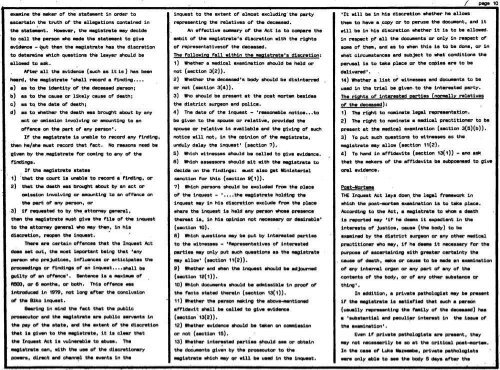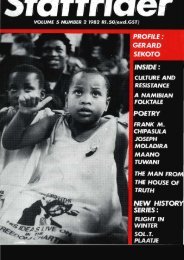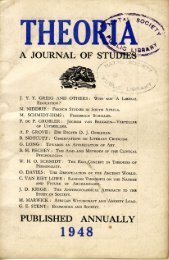Create successful ePaper yourself
Turn your PDF publications into a flip-book with our unique Google optimized e-Paper software.
examine the moker of the iUt#Mnt in order to<br />
ascertain the truth of the ellegatlons contained in<br />
the statement. Hwvir, the magistrate may decide<br />
to call th« parson who made tha statement to giva<br />
evidence - but than tha magistrate haa tha discration<br />
to determine which quaationa tha lawyer ahould be<br />
alloaad to ask.<br />
After all tha avldanca (such aa it is ) has baan<br />
hesrd* tha Magistrate 'shall racord a finding,...<br />
a) aa to tha identity of tha deceased person;<br />
b) aa to the cause or likely cause of death;<br />
0) as to the dete of death}<br />
d) aa to whether tha death eas brought about by any<br />
act or omission Involving or amounting to an<br />
offence on the part of any person*.<br />
Zf the amglstrate is unable to record any finding,<br />
then he/she must record that fact. No reasons need be<br />
given by the.magietrete for coning to any of tha<br />
findings.<br />
If the moglfttrete states<br />
1) that the court is unable to record e finding, or<br />
2) that tha death eas brought about by an act or<br />
omission involving or amounting to an offence on<br />
the part of any person, or<br />
3) if requested to by the attorney general,<br />
then the magistrate must give the file of the inquest<br />
to the attorney general who may then, in hie<br />
discretion, reopen the InQuost.<br />
There mrm certain offences that the Inqueat Act<br />
does set out, the Boat important being that "any<br />
person who prejudices, influences or anticipates the<br />
proceedings or findings of an inqueat....shall be<br />
guilty of an offence 1 . Sentence is a maximum of<br />
R900, or 6 months, or both. Thie offence eas<br />
Introduced In 1979, not long after the conclusion<br />
of the Biko inquest.<br />
Bearing in elnd tha fact that tha public<br />
prosecutor and the aaglatrate ere public eervants in<br />
the pay of the state, and the extent of the discretion<br />
thet ie given to the megletrete, It le clear that<br />
the Inojjest Act is vulnerable to ebuae. The<br />
magistrate can, with the uee of the discretionary<br />
powers, direct end channel the events in the<br />
inquest to the extent of almost excluding the party<br />
representing the relatives of the deceased*<br />
An effective summary of the Act is to compare the<br />
embit of the magistrate'a discretion with the rights<br />
of representstiveeof the deceased.<br />
The following fall elthln the magistrate's discretion:<br />
1) Vhether a medical examination should be held or<br />
not (eectlon 3(2)).<br />
2) thether the deceased's body should be disinterred .<br />
or not (section 3(d)).<br />
3) Who should be present at the poet mortem besldee<br />
tha district surgeon and police.<br />
4) Tha date of the Inqueat - 'reasonable notice.*.to<br />
be given to the spouse or relative, provided the<br />
spouse or relative is available 9^S the giving of such<br />
notice eill not, in the opinion of the magistrate,<br />
unduly delay the inquest 1 (section ?).<br />
5) which witnesses should be celled to give evidence.<br />
6) which assessors should alt with the Magistrate to<br />
decide on the findings: must alao get Ministerial<br />
sanction for this (section 9(0).<br />
?) which persons should be excluded froe the place<br />
of the lnqueet - '....the mmgietrate holding the<br />
lnqueet mey In hia discretion exclude froe the place<br />
where tha lnqueet le held eny person whose presence<br />
thereat is, in his opinion not necessary or desirable'<br />
(section 10).<br />
a) wnich questions way be put by Interested partlee<br />
to the witnessee - 'Representatives of interested<br />
parties aay only put such questions as the magistrate<br />
aay allow* (section 11(2)).<br />
9) whether and when the inquest should be ertjournod<br />
(eectlon 12(1»,<br />
10) which documents should be eoMesible In proof of<br />
the facts stated therein (section 13(1)).<br />
11) Ihether the person making the above-mentioned<br />
affidavit shell be celled to give evidence<br />
(section 13(2)).<br />
12) Whether evidence Should be taken on commission<br />
or not (section 15).<br />
13) whether Interested pertlee should see or obtain<br />
. •<br />
the documents given by the prosecutor to the<br />
magistrate ehlch aey or will be used in the lnqueet.<br />
'It will be in hie discration whether he ellowe<br />
/ P*ge 10<br />
thee to have a copy or to peruse the document, and it<br />
will be in his discretion whether It Is to be ellowed.<br />
in respect of all tha documents or only In respect of<br />
ecme of thsmf and aa to shen this le to be done, or in<br />
what circumstances and subject to whet conditions the<br />
perueel is to take place or tha copies ere to be<br />
delivered 1 . .<br />
14) whether e list of witnesses and documents to be<br />
used in the trial be given to the interested party.<br />
The rights of interested parties (normolly relotlves<br />
of the deceased):<br />
1) The rigiht to nominate legal representation.<br />
2) The right to nominate e medical practitioner to be<br />
present et the medical examination (eectlon 3(a)(b)).<br />
3) To put such questions to witnesses as the<br />
magietrate may allow (section 11(2).<br />
4) To hand in affidavlte (section 13(l)) - eno ash:<br />
that the makers of the effldevits be aubpoenaad to give<br />
orel evidence.<br />
Poet-mdrtomo<br />
THE lnqueet Act leys down the legal framewor* in<br />
which the post mortem exeminetion le to tmfce piece.<br />
According to the Act t a meglatrate to whom e death<br />
la reported may *if he deeme it expedient in the<br />
Interests of Justice, ceuss (the body) to be<br />
examined by tha district surgeon or eny other medical<br />
practitioner who amy, if he demse it necessary for the<br />
purpose of ascertaining with greater certainty the<br />
cause of dwwth, meke or causa to be mode en examination<br />
of any internal organ or any part of any of the<br />
contente of the body, or of any other eubatance or<br />
thing'.<br />
In addition, a private pathologist may be present<br />
If the Magistrate is satisfied thet such e person<br />
(usually representing the family of the deceased) haa<br />
a 'substantial and peculiar interest in the issue of<br />
tha examination'.<br />
Even if privets pathologists are present, they<br />
may not neceesarily be so et the critical post-mortem.<br />
In the case of Luke •mtwamba, private pathologists<br />
were only able to ess the body 5 deya after the

















